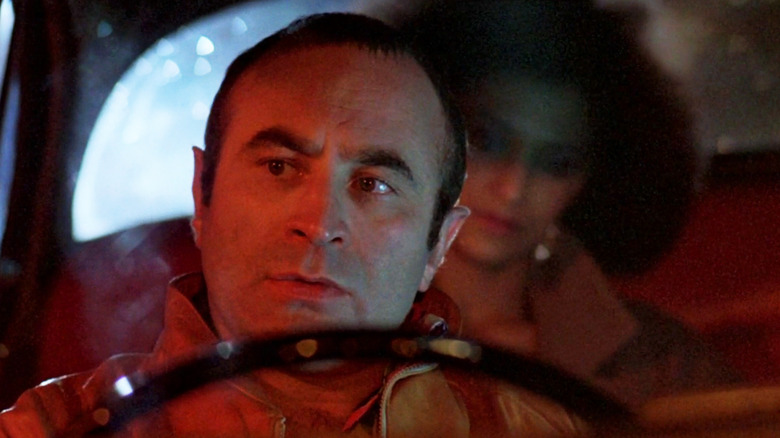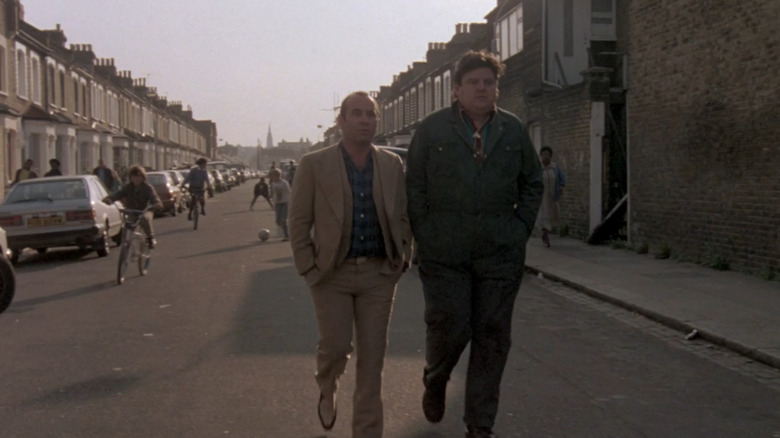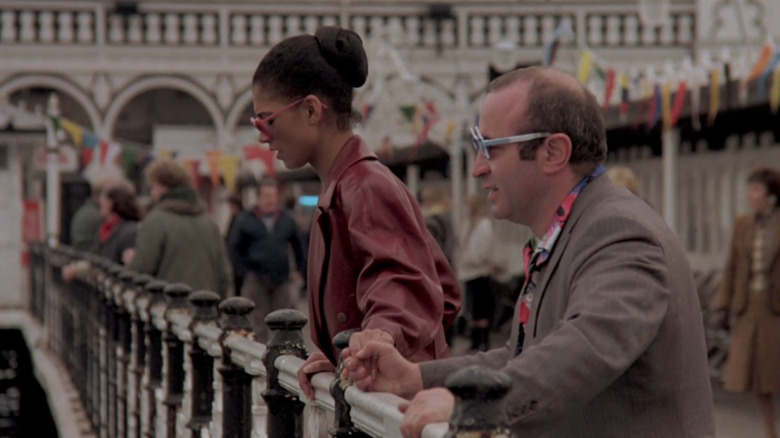Director Neil Jordan Totally Reworked His British Crime Film Mona Lisa After Meeting Bob Hoskins [Exclusive]
If you're a 90s kid like me, you probably know Bob Hoskins from playing Smee in "Hook" and private eye Eddie Valiant in "Who Framed Roger Rabbit." I even remember him showing up in a standout "Frasier" episode where he played Dr. Crane's abrasive, cigar-addicted gym teacher, Coach Fuller. But if you look beyond his best-known roles, the man was one of the most versatile actors to ever do it. In fact, he started his film career not in charming, family-friendly projects, but by playing a ruthless London gangster.
"The Long Good Friday" is a 1980 crime thriller starring Hoskins as Harold Shand — a crime boss looking to go legit. Over the course of the film, Shand becomes increasingly violent and Hoskins portrays the gangster's struggles with his aggressive impulses with unsettling ease. But as we all now know, the actor was more than capable of playing much more diverse roles, and had a real soft side to him. One reviewer described Hoskins as "the world's most adorable vicious pitbull," and that's exactly what director Neil Jordan saw in him.
Back in the '80s, the filmmaker who would eventually direct "Interview With The Vampire" and "Ondine" was looking to cast his neo noir film "Mona Lisa," which he had co-written with David Leland. Jordan, whose latest noir effort "Marlowe" just debuted, came to Hoskins in the hope he would play the lead role of George — a low-level gangster who's assigned as a chauffeur to call girl Simone (Cathy Tyson). But the meeting with Hoskins — who passed away in 2014 — would end up influencing "Mona Lisa" in a ways Jordan likely never envisioned.
'Suddenly, I saw a totally different character'
After "The Long Good Friday" (one of the best mob movies ever), Bob Hoskins developed a reputation for playing tough guys. But the Londoner had more to offer, having appeared in everything from Shakespeare plays to BBC dramas, and Neil Jordan suspected as much after meeting with the actor for "Mona Lisa."
/Film's Jack Giroux spoke with Jordan about "Marlowe," but the conversation turned to his meeting with Hoskins for the 1986 crime drama. As the Irish filmmaker explained:
"Basically, I had written the script for 'Mona Lisa,' and I wrote it with another writer called David Leland. It was rather harsh and savage. David had one sense of what this story could be. I met Bob Hoskins and I showed him the script, and suddenly, I saw a totally different character. I saw this guy with this huge heart, with this great capacity for violence, but actually this huge emotional kind of thing."
Having gotten a sense that Hoskins was much more than his "Long Good Friday" role would suggest, Jordan hurriedly rewrote the entire "Mona Lisa" script to better fit the actor's more nuanced abilities:
"I met with him, went off for two weeks, came back with a different script, gave it to him, said, 'What do you think now?' And he loved it. I really wanted that movie to be about a man who generally didn't understand women, and that's what Bob played. It was lovely to do."
Jordan toned down the violence and took George from a more traditionally brutish gangster type to a multi-layered character whose struggles to understand women and his place within the criminal underworld gave the film a whole new dimension. It also garnered Hoskins an Oscar nomination and a BAFTA win for Best Actor.
Jordan saw Hoskins' potential early on
Bob Hoskins recalled his initial meeting with Neil Jordan on the set of "Mona Lisa," where he remembered how George was almost a "superhero" type in the initial script, "bashing people up all over the place." Interestingly, the actor described this first draft not as unsuitable for him, but "wrong," saying:
"It was wrong somehow and Neil knew it was wrong. He came round and said, 'What's wrong?' and we went through it and I said what I thought was wrong. And then he came back a month later with a completely new script and it was George. I suppose he's a sort of mixture of Norman Wisdom and Lou Grant"
As the plot of "Mona Lisa" progresses, George finds himself falling for Simone, and increasingly at odds with his boss, Denny (Michael Caine, who graciously stepped in to support his friend Hoskins when he saw the part called for a lead actor in a minor role). George's character trajectory called for a much more subtle performance from Hoskins than was needed in his role as Harold Shand, and his ability to take on that challenge and succeed so spectacularly was the first indication that the man had a serious talent beyond his tough-guy typecasting. While "Marlowe," with its "Blade-Runner" inspired 1930s Los Angeles, doesn't quite hit the same heights as "Mona Lisa," Jordan's ability to see Hoskins' range at an early stage, and help him build the diverse career that he did, remains one of his best contributions to the industry.


